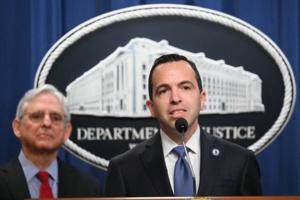Health Advice
/Health

Want to lower your dementia risk? Becoming a teacher is a good start
From your 30s to well into your 60s, a new study proposes working a mentally challenging job can pay off in more ways than one. It can even help maintain your cognitive health while preventing dementia later in life.
“Our results show the value of having an occupation that requires more complex thinking as a way to maintain memory and ...Read more

FTC chief says tech advancements risk health care price fixing
New technologies are making it easier for companies to fix prices and discriminate against individual consumers, the Biden administration’s top consumer watchdog said Tuesday.
Algorithms make it possible for companies to fix prices without explicitly coordinating with one another, posing a new test for regulators policing the market, said ...Read more

Do implicit bias trainings on race improve health care? Not yet – but incorporating the latest science can help hospitals treat all patients equitably
There is increasing evidence that implicit bias – non-conscious attitudes toward specific groups – is a source of racial inequities in certain aspects of health care, and lawmakers are taking note.
Since the tragic murder of George Floyd in May 2020, wherein a Black man was killed by police, several U.S. federal and state ...Read more

Nearsightedness is at epidemic levels – and the problem begins in childhood
Myopia, or the need for corrected vision to focus or see objects at a distance, has become a lot more common in recent decades. Some even consider myopia, also known as nearsightedness, an epidemic.
Optometry researchers estimate that about half of the global population will need corrective lenses to offset myopia by 2050 if current ...Read more

Environmental Nutrition: Spotlight on supplements: Kava
Kava is a compound (extracted from a plant member of the pepper family called Piper methysticum) native to islands of the western Pacific.
Overview
The root of the plant is emulsified into a beverage or it can be dried and incorporated into dietary supplement form. Kava may also be called kava-kava, kavain, yaqona, and more.
Historically, ...Read more

What are nitrates and are they bad for your health?
Nitrates in cured meats, such as bacon, hot dogs and cold cuts, have long had a bad rap, but more recently there’s been a lot of talk about the health benefits of nitrates in beets and other vegetables. Confusing? Yes. But we’ll straighten it all out for you.
What are nitrates?
Nitrates are compounds made up of nitrogen and oxygen. Most ...Read more

Mayo Clinic Q&A: Advances in care for medication-resistant epilepsy
DEAR MAYO CLINIC: My son is in his 20s and has had epilepsy for years. He had undergone extensive evaluation over a decade ago. Lately, his medication hasn’t been effectively preventing seizures. What are some of the innovations available to provide him the chance of seizure freedom and improve his quality of life?
ANSWER: An epilepsy ...Read more

Mayo Clinic Minute: Dermatologist explains light therapy for skin
Dermatologists advise their patients to avoid harmful ultraviolet light, which can cause skin damage, photoaging and skin cancer. But they also may prescribe light therapy to treat certain skin conditions. Light therapy is a treatment that uses different wavelengths of light to treat various skin conditions.
In this Mayo Clinic Minute, Dr. Dawn...Read more

What to do when driving skills decline
This is the second half of a two-part series on making decisions about driving as we age.
It’s a simple but unfortunate fact: Driving skills can wane over time.
Eventually, driving can become unsafe for an older driver, their passengers, and others on the road. If you notice a decline in driving abilities in a loved one, or in yourself, what...Read more

Patients have a right to an observer to prevent sexual misconduct in doctors' offices, new NJ rules say
New Jersey is proposing new rules to better protect patients from sexual misconduct in doctors' offices.
The rules would require doctors to confirm that patients have read and understood their right to have another licensed medical professional present as an observer before proceeding with a sensitive examination, including breast, pelvic, ...Read more

Meningococcal disease on the rise in the US
A rise in invasive serogroup Y meningococcal disease has prompted the Centers for Disease Control and Prevention to issue a health advisory for health care providers.
"Meningococcal disease is a bacterial infection caused by Neisseria meningitidis. About 1 in 10 people are natural carriers of the bacteria, and it can spread to others by sharing...Read more

What you eat could alter your unborn children and grandchildren’s genes and health outcomes
Within the last century, researchers’ understanding of genetics has undergone a profound transformation.
Genes, regions of DNA that are largely responsible for our physical characteristics, were considered unchanging under the original model of genetics pioneered by biologist Gregor Mendel in 1865. That is, genes were thought to be ...Read more

Mayo Clinic Minute: Creating an advance directive for your future well-being
No one can predict the future, but putting together an advance directive can bring you peace of mind and a plan for your medical care during an emergency or end of life.
Dr. Maisha Robinson, chair of the Palliative Medicine Department at Mayo Clinic in Florida, advises people to have these conversations with family members and loved ones.
"An ...Read more

Medicare's push to improve chronic care attracts businesses, but not many doctors
Carrie Lester looks forward to the phone call every Thursday from her doctors’ medical assistant, who asks how she’s doing and if she needs prescription refills. The assistant counsels her on dealing with anxiety and her other health issues.
Lester credits the chats for keeping her out of the hospital and reducing the need for clinic visits...Read more

Cannabis legalization has led to a boom in potent forms of the drug that present new hazards for adolescents
Eventually, most adults reach a point where we realize we are out of touch with those much younger than us.
Perhaps it is a pop culture reference that sparks the realization. For me, this moment happened when I was in my late 20s and working with adolescents in school settings to help them quit smoking. When other drugs would ...Read more

'Miracle' weight-loss drugs could have reduced health disparities. Instead they got worse
LOS ANGELES -- The American Heart Association calls them "game changers."
Oprah Winfrey says they're "a gift."
Science magazine anointed them the "2023 Breakthrough of the Year."
Americans are most familiar with their brand names: Ozempic, Wegovy, Mounjaro, Zepbound. They are the medications that have revolutionized weight loss and raised ...Read more

Avian flu outbreak raises a disturbing question: Is our food system built on poop?
If it’s true that you are what you eat, then most beef-eating Americans consist of a smattering of poultry feathers, urine, feces, wood chips and chicken saliva, among other food items.
As epidemiologists scramble to figure out how dairy cows throughout the Midwest became infected with a strain of highly pathogenic avian flu— a disease ...Read more

Native Americans have shorter life spans. Better health care isn't the only answer
HISLE, S.D. — Katherine Goodlow is only 20, but she has experienced enough to know that people around her are dying too young.
Goodlow, a member of the Lower Brule Sioux Tribe, said she’s lost six friends and acquaintances to suicide, two to car crashes, and one to appendicitis. Four of her relatives died in their 30s or 40s, from causes ...Read more

Ask the Pediatrician: How to manage screen time and temper tantrums
Are you concerned about the time your child spends on digital devices? If so, you're hardly alone. Many parents and caregivers worry that screen time is taking over their child's day (and night), crowding out other activities they need for good health.
It helps to create a family media plan to set healthy digital habits. You may decide you want...Read more

Family caregivers face financial burdens, isolation and limited resources − a social worker explains how to improve quality of life for this growing population
Millions of Americans have become informal family caregivers: people who provide family members or friends with unpaid assistance in accomplishing daily tasks such as bathing, eating, transportation and managing medications.
Driven in part by a preference for home-based care rather than long-term care options such as assisted living ...Read more
Popular Stories
- Nearsightedness is at epidemic levels – and the problem begins in childhood
- Do implicit bias trainings on race improve health care? Not yet – but incorporating the latest science can help hospitals treat all patients equitably
- Mayo Clinic Minute: Dermatologist explains light therapy for skin
- What are nitrates and are they bad for your health?
- Environmental Nutrition: Spotlight on supplements: Kava





